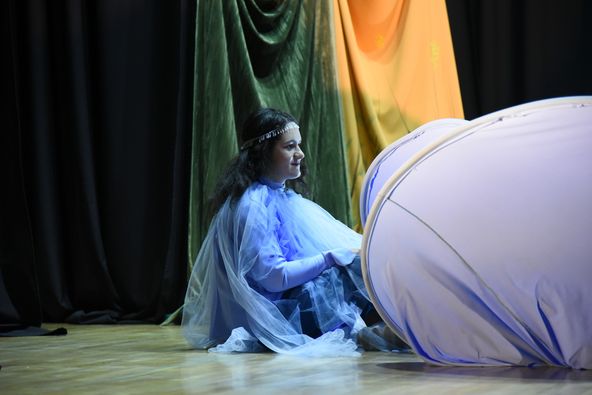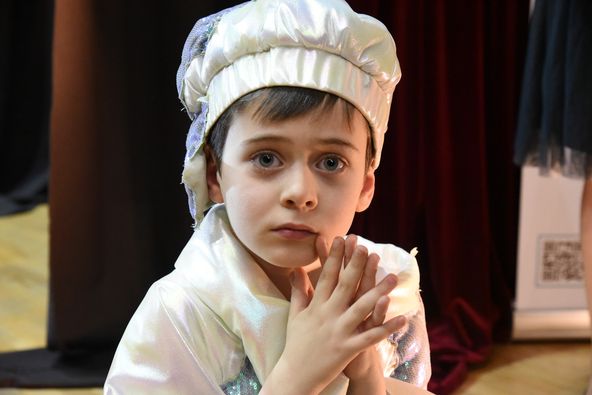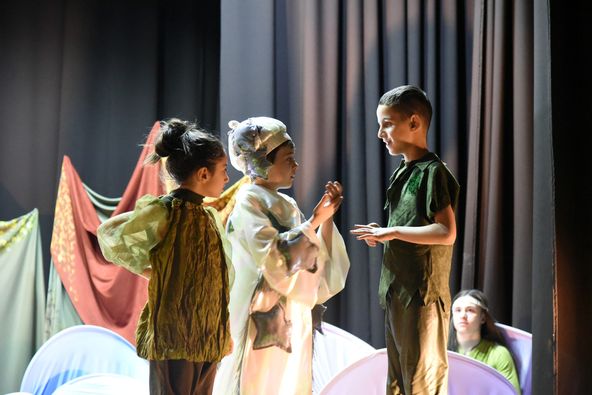
Children in the theatrical performance
Children Show the Therapeutic Power of Drama
by Muriel Mirak-Weissbach
the Armenian Mirror Spectator
JANUARY 25, 2024 — In recent years, numerous governments and public institutions have devoted increasing attention to promoting harmony among diversity in society. While political bodies may have established legal guidelines for integrating persons of different backgrounds, cultures and personal capabilities, creative approaches by therapists in the cultural realm have developed exciting results in theater. Drama therapy has proven to be an effective means for individuals to interact on a metaphorical level, to play roles in fictional narratives that allow them to deal with difficulties, whether real disabilities or emotional, psychological barriers to healthy social interchange. And in so doing on the stage, they educate audiences to tolerance and inclusivity.

A young performer
The concept is as old as Aristotle, who introduced the idea that drama could produce catharsis in an audience. Dealing specifically with tragedy, he defined it as “the imitation of an action that is serious and also, as having magnitude, complete in itself . . . with incidents arousing pity and fear, wherewith to accomplish its catharsis of such emotions.” But it is not only tragedy that has this power of catalyzing emotional change, nor is the viewer the only one to experience its impact. The players on the stage, whether in comedy or tragedy, themselves undergo transformation or development in emotion and attitude.
And for children it can be great fun. That is the experience of youngsters participating in projects of the Republican Pedagogical-Psychological Center (RPPC), established in 2017 as the reorganized successor to the Yerevan Center for Medical-Psychological-Pedagogical Assessment. Working as a government-regulated institution, the RPPC coordinates pedagogical and psychological assistance to children, deals with special needs and seeks to enhance their academic and social lives. It provides the necessary training facilities and services to personnel at all levels involved in the work. It cooperates with state, international, and non-governmental organizations, as well as various Ministries of the Republic of Armenia and institutions of advanced education.
In March 2022, the RPPC launched the MIASIN (Together) inclusive theater studio, under Marine Asatryan. Asatryan, who has been working with youngsters in art projects since 1988, has specialized over the past 15 years in using play-acting to enhance inclusiveness. The studio project currently has 12 children (4 boys and 8 girls), some of them with disabilities. Its purpose is to foster creativity in the children, increasing their awareness and acceptance of themselves and others, with their strengths and weaknesses, and thereby facilitating their social integration. Success in these endeavors contributes to raising awareness and acceptance of diversity among all social layers.
The theater group put on its first play in October 2022, whose title “Stronger Than You Seem,” comes from A. A. Milne’s Winnie the Pooh, a literary classic for children. Three hundred guests attended the Yerevan performance. For the following year, the group planned to offer multiple performances of the play in the Yerevan, Armavir, and Shirak regions, where they could reach more than 700 children and adults. In 2023, with five more children joining the group, it also added a new play to its repertoire, “Jrashushan Journey” (“The Journey of the Water Lily”).

Some of the young performers
At the premiere of the new play in Yerevan on December 18, 2023, at the Armenian School of Public Education at Kh.Abovyan University, the young actors and actresses came on stage with the words, “Whatever it is, we will not give up; And we will always move forward, always forward.” This sums up the message of the play. It tells the story of a Mother Water Lily who wants to educate her youngsters to become adult, gracious, and mature Lilies. She warns them that it is going to be a long journey, a difficult one, full of dangers and obstacles. The “Seeds” must be smart enough to deal with adversity, mastering challenges to eventually become real Water Lilies. After going through storms and even facing wild animals, in the end they turn into real beauties. Their determination provides the kindness, truth, and patience required to overcome difficulties.
The play is true to life for many children. One girl portraying a “Seed” triumphs over speech disorders and motor skills issues. She realizes that the story she is enacting is important because, she says, it “shows that conquering challenges is part of realizing our dreams.”
Lilith Manticyan, director of the RPPC, praised the close cooperation among the organizers, players, and parents. Araxia Svajyan, Deputy Minister of Education, Science, Culture and Sport, congratulated the cast and producers, expressing confidence that the play would appear on several stages and would communicate its positive emotions and optimistic message throughout the country. Plans are already afoot for a national tour of the play. As a token of appreciation for their efforts and performance, which featured original music, beautiful costumes and sets, the young players and volunteers received awards.
(Material for this article was provided by Margarit Piliposyan of Fund for Armenian Relief (FAR), which sponsored the project together with the Mirak-Weissbach Foundation.)